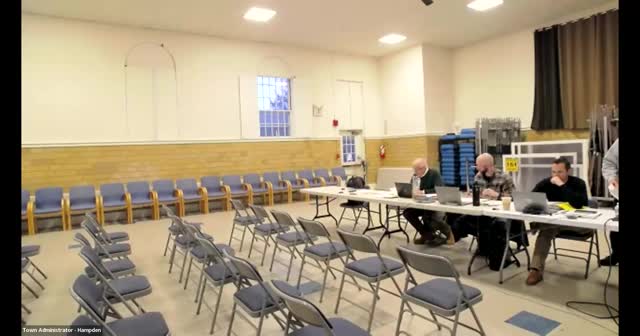Select board reviews Hampden–Wilbraham regional school agreement changes, raises questions on weighted voting and capital apportionment
Get AI-powered insights, summaries, and transcripts
Subscribe
Summary
Select Board members reviewed proposed changes to the Hampden–Wilbraham Regional School District agreement, focusing on a Department of Elementary and Secondary Education requirement for weighted voting, how capital costs would be apportioned for leased buildings and potential town approval of capital projects.
Select Board member Don said the Town of Hampden received a proposed amended regional school agreement from the Hampden‑Wilbraham Regional School Committee and representatives from the Department of Elementary and Secondary Education were pressing for specific changes.
The committee language would require that each member town’s representative carry a single "weighted" vote tied to population, to ensure compliance with the federal “one person, one vote” principle. That would change current practice in which Hampden and Wilbraham’s representation and district appropriation formula (often described as a "5 and 2" split) already influence each town’s power in district matters. Don said the proposed weighted voting could mean an individual Hampden member holds less than one full vote (he cited an example of ~0.85) and described scenarios in which a majority of members from the larger town could meet a weighted majority without broad cross‑town support.
The Select Board discussed several practical implications raised at the school committee meeting: capital cost apportionment for leased or member‑town buildings, how assigned students would affect capital shares, whether towns retain effective approval authority over major capital projects, and the technical mechanics of withdrawing from the district. Under the draft, capital costs for a district‑used, leased single‑school building would be apportioned by foundation enrollment at the time of expenditure; officials noted a current example where Hampden’s proportional share would be about 18.7% and Wilbraham’s about 81.3% for a particular building.
Board members pressed for citations and the legal basis of the state’s interpretation of “one person, one vote” as requiring weighted votes. Several members said they would seek the exact statutory or case citations the Department of Elementary and Secondary Education relies on before considering acceptance or comment. They also noted that other regional districts have adopted weighted voting arrangements and that weightings are reviewed periodically (the draft calls for review every five years using town‑certified ratios).
Select Board members and staff discussed practical steps: asking the school committee for the statutory citation, re‑examining how the district’s voting and funding formulas interact (the existing regional appropriation split), and requesting clarification on whether the weighted vote requirement applies to elected versus appointed committee members. Don and another member pointed out that capital projects remain subject to town‑level votes: Hampden voters would individually vote on capital appropriations assessed to the town as part of their annual or special town meeting process.
Board members asked staff to request a clearer legal justification from the Department of Elementary and Secondary Education and to circulate examples from other regional districts that use weighted voting. They also asked for a fresh air‑quality test if proposals move forward for capital work at the regional middle school, because mold remediation and indoor air quality had been discussed at the school committee level.
The board took no formal vote on the regional agreement at the meeting; members said they would return with requested citations and follow up with the school committee and town counsel before placing any warrant language or recommendation on a future town meeting agenda.
